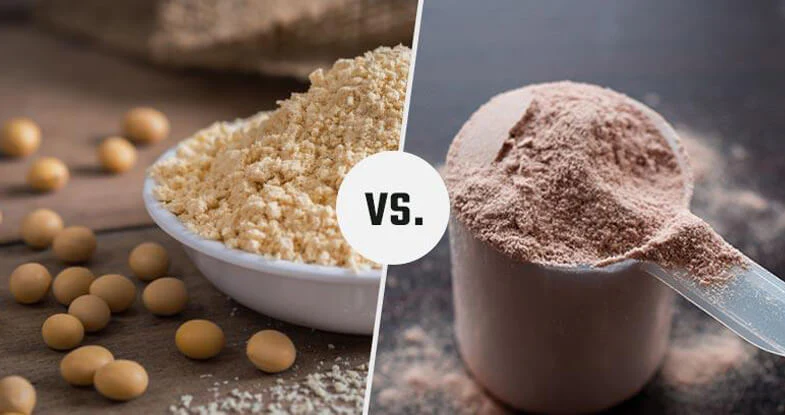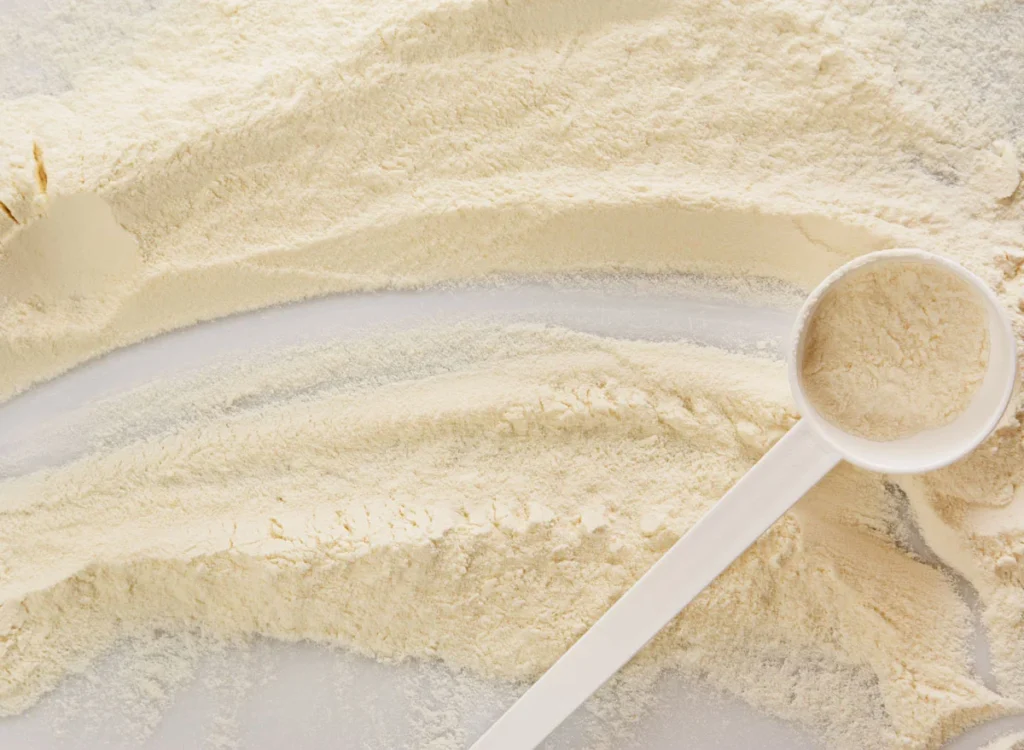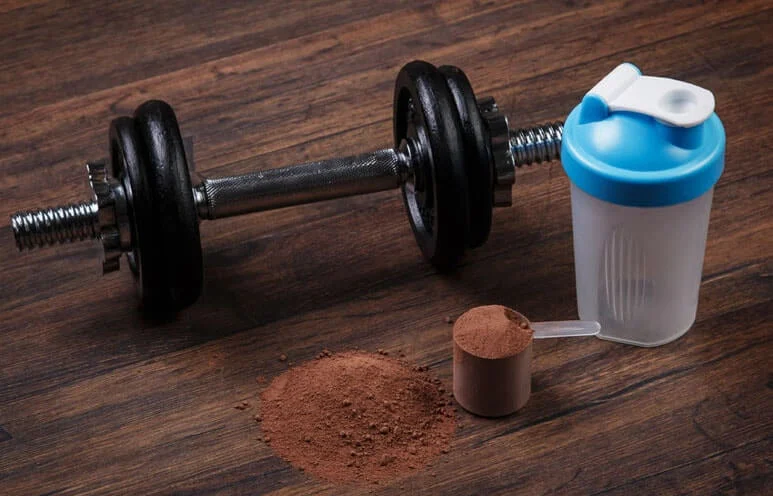Dans le monde des compléments alimentaires, la bataille entre les protéines de soja et les protéines de lactosérum est un combat classique. D'un côté, nous avons la protéine de lactosérum, championne incontestée du monde des produits laitiers, louée pour sa rapidité d'absorption et ses prouesses en matière de construction musculaire. Dans l'autre coin, on trouve isolat de protéine de soja, le redoutable challenger à base de plantes, qui présente un profil complet d'acides aminés et de solides références en matière de santé.
Depuis des décennies, les amateurs de sport et les athlètes débattent : Laquelle est vraiment la meilleure ? La réputation du lactosérum résiste-t-elle à l'examen scientifique ? Les craintes entourant le soja sont-elles légitimes ?
Si vous êtes paralysé par le choix dans le rayon des compléments alimentaires, ce guide est fait pour vous. Nous allons mettre ces deux géants des protéines face à face dans une épreuve de force à plusieurs rounds, fondée sur des données probantes. À la fin, vous saurez non seulement lequel est le meilleur, mais aussi lequel est le champion incontesté des protéines. vous.
Le verdict rapide
- Pour une stimulation musculaire plus rapide : La protéine de lactosérum a un léger avantage en raison de sa teneur plus élevée en leucine et de sa vitesse de digestion plus rapide, ce qui la rend théoriquement optimale pour une récupération immédiate après l'entraînement.
- Pour un gain global de muscle et de force : Lorsque l'apport quotidien total en protéines est suffisant, des recherches de grande qualité montrent que pas de différence significative entre le soja et le lactosérum pour une croissance musculaire et un développement de la force à long terme.
- Le choix est personnel : La meilleure protéine en poudre dépend en fin de compte de vos préférences alimentaires (végétalien ou laitier), de votre budget, de votre tolérance digestive et de vos objectifs de santé spécifiques.
Rencontrez les concurrents : Qu'est-ce que l'isolat de soja et les protéines de lactosérum ?
Protéines de lactosérum : Le roi du lait Le lactosérum est l'une des deux principales protéines du lait (l'autre étant la caséine). Au cours du processus de fabrication du fromage, le lactosérum est séparé en tant que sous-produit liquide, qui est ensuite filtré et séché pour devenir une poudre. Il se présente sous trois formes principales :
- Concentré de lactosérum (WPC) : Contient environ 70-80% de protéines, avec un peu de lactose (sucre du lait) et de matières grasses.
- Isolat de lactosérum (WPI) : Transformé pour éliminer la majeure partie du lactose et des matières grasses, ce qui lui confère une teneur en protéines de 90%+. Idéal pour les personnes légèrement sensibles au lactose.
- Hydrolysat de lactosérum (WPH) : Pré-digéré pour une absorption la plus rapide possible, mais souvent plus cher et avec un goût plus amer.
Isolat de protéines de soja : Le champion des plantes L'isolat de protéines de soja est dérivé de graines de soja dégraissées. Les fèves sont traitées de manière à éliminer la quasi-totalité des glucides et des graisses, ce qui permet d'"isoler" la protéine. La poudre ainsi obtenue contient plus de 90% de protéines, ce qui en fait l'une des sources de protéines d'origine végétale de la plus haute qualité qui soit.
Round 1 : Le conte nutritionnel de la cassette
La valeur d'une protéine est déterminée par ses éléments constitutifs : les acides aminés. Voici comment ils se présentent.
- Profil d'acides aminés : Le lactosérum et le soja sont tous deux protéines complètesCela signifie qu'elles contiennent les neuf acides aminés essentiels (AAE) que votre corps ne peut pas produire lui-même. Il s'agit d'une grande victoire pour le soja, car de nombreuses protéines végétales sont incomplètes.
- La décomposition des BCAA et le facteur leucine : Parmi les AAE, trois sont particulièrement importants pour la croissance musculaire : les acides aminés à chaîne ramifiée (BCAA), à savoir la leucine, l'isoleucine et la valine. Leucine est l'acteur principal incontesté. Il s'agit de la "clé de contact" qui démarre le moteur de la construction musculaire de votre corps, un processus connu sous le nom de Synthèse des protéines musculaires (SPM). Pour déclencher efficacement la MPS, vous devez atteindre un certain "seuil de leucine", et c'est là que le lactosérum donne son premier coup de poing.
- Protéine de lactosérum : Une portion typique de 25 grammes fournit environ 2,7-3,0 grammes de leucine.
- Isolat de protéines de soja: Une portion de 25 grammes fournit environ 2,0-2,2 grammes de leucine.
Bien que les deux soient de bonnes sources, le lactosérum fournit systématiquement environ 25-30% de leucine en plus par gramme de protéine, ce qui lui permet d'appuyer plus puissamment sur le bouton d'allumage de la construction musculaire.
- Scores de qualité des protéines : Les scientifiques utilisent des scores tels que PDCAAS et DIAAS pour évaluer la digestibilité et la qualité d'une protéine. Les isolats de protéines de lactosérum et de soja obtiennent tous deux des résultats exceptionnels, avec un score PDCAAS de 1,0 (le score le plus élevé possible), ce qui indique une qualité et une digestibilité excellentes pour les deux.
Vainqueur du premier tour : Protéines de lactosérum (de justesse, en raison de sa teneur supérieure en leucine).
Round 2 : L'événement principal - Croissance et force musculaires
C'est la partie qui compte le plus pour les athlètes. Comment ces différences nutritionnelles se traduisent-elles en gains réels ?
- Vitesse de digestion et MPS : La protéine de lactosérum est réputée pour sa rapidité de digestion. Elle provoque un pic brutal et rapide des niveaux d'acides aminés dans le sang, stimulant puissamment la MPS peu de temps après sa consommation. La protéine de soja est digérée à une vitesse plus modérée, intermédiaire. Cela fait de la whey la gagnante théorique d'un shake post-entraînement lorsque vous voulez démarrer la récupération aussi vite que possible.
- Que disent les études comparatives sur les gains à long terme ? Un pic rapide de MPS est une bonne chose, mais cela se traduit-il par plus de muscle et de force au fil des semaines et des mois d'entraînement ? C'est là que le combat devient intéressant. Pour répondre à cette question, nous examinons les méta-analyses, l'étalon-or des preuves, qui combinent les résultats de nombreuses études.
- Étude de cas : Une méta-analyse de 2018 sur les gains de muscle et de force : Une importante méta-analyse publiée dans la revue International Journal of Sport Nutrition and Exercise Metabolism (Journal international de la nutrition sportive et du métabolisme de l'exercice) a voulu trancher ce débat. Les chercheurs ont compilé les données de neuf essais cliniques de haute qualité qui ont directement comparé les effets de la supplémentation en protéines de soja et de lactosérum en conjonction avec l'entraînement de résistance. Après avoir analysé toutes les données, leur conclusion était claire : "Les résultats suggèrent que la supplémentation en protéines de soja contribue à améliorer la force et la masse corporelle maigre de la même manière que les protéines de lactosérum."
Vainqueur du deuxième tour : Dessiner. Alors que la whey peut gagner le sprint (pic de MPS à court terme), le soja garde le rythme dans le marathon (gains de muscle et de force à long terme).
Cycle 3 : Santé, hormones et digestion
Une poudre de protéines doit soutenir votre santé, et non l'entraver.
- Le débat sur les hormones (encore) : Mettons les choses au clair. Comme nous l'avons vu dans notre précédent article, Les essais sur l'homme ne montrent systématiquement aucune modification cliniquement pertinente de la testostérone avec la consommation de soja. Une méta-analyse de 2021 (41 ECR) confirmée la testostérone sérique est restée inchangée (95%CI : -0,13 à 0,19 nmol/L), même à des doses allant jusqu'à 70 g de protéines de soja par jour (Zaheer et al. 2021). La FDA déclare : Il n'existe aucune preuve d'effets féminisants chez les hommes à des niveaux de consommation typiques.. Pour les hommes comme pour les femmes, une consommation modérée de soja est considérée comme sûre d'un point de vue hormonal.
- Des bénéfices au-delà du muscle :
- Lactosérum : Contient des composés bioactifs comme la lactoferrine et les immunoglobulines, qui peuvent avoir des propriétés de soutien immunitaire.
- Le soja : Les protéines de soja ont été associées à des bienfaits cardiovasculaires. La FDA a approuvé une allégation de santé selon laquelle 25 grammes de protéines de soja par jour peuvent réduire le risque de maladie cardiaque en abaissant le cholestérol LDL ("mauvais" cholestérol).
- Le dilemme de la digestion : Il s'agit d'un facteur décisif pour de nombreuses personnes.
- Les faiblesses du lactosérum : Lactose. Le concentré de lactosérum contient une bonne quantité de lactose, qui peut provoquer des ballonnements, des gaz et des maux d'estomac chez les personnes intolérantes au lactose. L'isolat de lactosérum est débarrassé de la majeure partie du lactose et est souvent mieux toléré, mais il peut encore poser un problème aux personnes très sensibles.
- La faiblesse du soja : Certaines personnes trouvent que le soja peut provoquer des ballonnements ou des gaz en raison de la présence de certains oligosaccharides, bien que les isolats de haute qualité aient éliminé une grande partie de ces oligosaccharides. Il s'agit également d'un allergène majeur pour certaines personnes.
Vainqueur du 3e tour : Dessiner. Chacune d'entre elles présente des avantages uniques pour la santé et des inconvénients potentiels pour la digestion, en fonction de l'individu.
Round 4 : Praticité - Goût, mélange et prix
- La bataille des saveurs et des textures : En général, la protéine de lactosérum l'emporte dans cette catégorie. Elle a tendance à avoir un profil de saveur plus crémeux et plus neutre qui se mélange bien aux shakes. La protéine de soja peut parfois avoir un arrière-goût légèrement "beany" ou "earthy" et une texture plus granuleuse, bien que la technologie de fabrication ait considérablement amélioré ce point.
- Le coût par gramme de protéines : Typiquement, isolat de protéine de soja est plus économique que l'isolat de protéines de lactosérum. Pour ceux qui consomment des protéines en poudre quotidiennement, cette différence de coût peut s'avérer importante au fil du temps.
Vainqueur du quatrième tour : Une décision partagée. La whey l'emporte souvent en termes de goût, mais le soja l'emporte en termes de prix.
La décision du juge : Quelle poudre protéinée est la meilleure pour VOUS ?
Il n'y a pas de champion unique. Le gagnant est celui qui correspond le mieux à votre corps, à vos objectifs et à vos valeurs. Utilisez ce guide de décision pour choisir votre champion.
🏆 Choisir WHEY PROTEIN Si...
- Vous donnez la priorité à la récupération musculaire la plus rapide possible immédiatement après l'entraînement.
- Vous n'avez pas de problème avec les produits laitiers ou le lactose (ou vous êtes prêt à payer plus cher pour un isolat/hydrolysat de haute qualité).
- Vous êtes très exigeant en matière de goût et de mélange.
- Votre budget est flexible.
🏆 Choisir l'ISOLAT DE PROTEINE DE SOY Si...
- Vous suivez un régime végétalien ou à base de plantes.
- Vous souffrez d'une intolérance au lactose ou d'une allergie aux produits laitiers.
- Vous recherchez l'option la plus rentable pour une utilisation à long terme.
- Vous vous intéressez aux bienfaits potentiels du soja pour la santé cardiovasculaire.
- Vous comprenez que pour des gains à long terme, il est tout aussi efficace que le lactosérum.
La stratégie hybride : Peut-on les mélanger ? Oui. Pour les utilisateurs expérimentés, le mélange de protéines de lactosérum et de soja (ou l'utilisation d'un mélange) peut offrir le meilleur des deux mondes : le pic rapide de MPS provenant de la teneur en leucine du lactosérum, combiné à la libération régulière d'acides aminés et aux différents bienfaits pour la santé du soja.
Pour plus d'informations et de recherches
Pour explorer la science et vérifier les affirmations faites dans cet article, veuillez consulter les sources suivantes qui font autorité :
Examinez.com : Une ressource indépendante et impartiale qui analyse la recherche scientifique sur des milliers de suppléments et de sujets liés à la nutrition.
Examiner - Page sur les protéines de soja
PubMed - La méta-analyse sur les muscles et la force : L'étude de 2018 citée dans cet article, qui n'a pas trouvé de différence significative entre le soja et le lactosérum pour les gains à long terme.
Healthline : Un portail d'information de confiance sur la santé qui propose des articles complets et fondés sur des données probantes sur la nutrition et la forme physique.
Healthline - Whey vs. Soy : Qu'est-ce qui est le mieux ?
Société internationale de nutrition sportive (ISSN) Positionnement : Une ressource académique détaillant le consensus scientifique sur les protéines et l'exercice.





